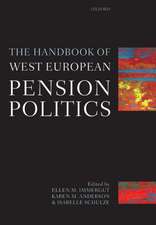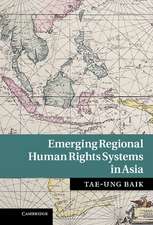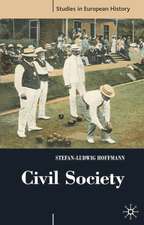Human Rights in the Twentieth Century: Human Rights in History
Editat de Stefan-Ludwig Hoffmannen Limba Engleză Paperback – 12 dec 2010
| Toate formatele și edițiile | Preț | Express |
|---|---|---|
| Paperback (1) | 272.75 lei 43-57 zile | |
| Cambridge University Press – 12 dec 2010 | 272.75 lei 43-57 zile | |
| Hardback (1) | 642.87 lei 43-57 zile | |
| Cambridge University Press – 19 dec 2010 | 642.87 lei 43-57 zile |
Din seria Human Rights in History
-
 Preț: 232.45 lei
Preț: 232.45 lei -
 Preț: 277.57 lei
Preț: 277.57 lei -
 Preț: 286.30 lei
Preț: 286.30 lei -
 Preț: 230.61 lei
Preț: 230.61 lei -
 Preț: 230.10 lei
Preț: 230.10 lei -
 Preț: 232.73 lei
Preț: 232.73 lei -
 Preț: 184.88 lei
Preț: 184.88 lei -
 Preț: 312.46 lei
Preț: 312.46 lei -
 Preț: 255.09 lei
Preț: 255.09 lei -
 Preț: 242.08 lei
Preț: 242.08 lei -
 Preț: 276.61 lei
Preț: 276.61 lei -
 Preț: 201.76 lei
Preț: 201.76 lei -
 Preț: 281.30 lei
Preț: 281.30 lei -
 Preț: 232.24 lei
Preț: 232.24 lei -
 Preț: 310.51 lei
Preț: 310.51 lei - 8%
 Preț: 564.42 lei
Preț: 564.42 lei - 9%
 Preț: 593.66 lei
Preț: 593.66 lei -
 Preț: 194.09 lei
Preț: 194.09 lei -
 Preț: 230.51 lei
Preț: 230.51 lei -
 Preț: 227.33 lei
Preț: 227.33 lei - 14%
 Preț: 895.53 lei
Preț: 895.53 lei - 11%
 Preț: 597.10 lei
Preț: 597.10 lei -
 Preț: 320.75 lei
Preț: 320.75 lei -
 Preț: 216.39 lei
Preț: 216.39 lei -
 Preț: 280.74 lei
Preț: 280.74 lei -
 Preț: 288.42 lei
Preț: 288.42 lei - 14%
 Preț: 757.85 lei
Preț: 757.85 lei - 11%
 Preț: 600.84 lei
Preț: 600.84 lei -
 Preț: 264.74 lei
Preț: 264.74 lei -
 Preț: 233.22 lei
Preț: 233.22 lei -
 Preț: 327.51 lei
Preț: 327.51 lei - 11%
 Preț: 537.58 lei
Preț: 537.58 lei -
 Preț: 288.25 lei
Preț: 288.25 lei - 14%
 Preț: 708.38 lei
Preț: 708.38 lei -
 Preț: 225.97 lei
Preț: 225.97 lei
Preț: 272.75 lei
Nou
Puncte Express: 409
Preț estimativ în valută:
52.19€ • 54.63$ • 43.44£
52.19€ • 54.63$ • 43.44£
Carte tipărită la comandă
Livrare economică 31 martie-14 aprilie
Preluare comenzi: 021 569.72.76
Specificații
ISBN-13: 9780521142571
ISBN-10: 0521142571
Pagini: 366
Dimensiuni: 156 x 234 x 20 mm
Greutate: 0.52 kg
Editura: Cambridge University Press
Colecția Cambridge University Press
Seria Human Rights in History
Locul publicării:New York, United States
ISBN-10: 0521142571
Pagini: 366
Dimensiuni: 156 x 234 x 20 mm
Greutate: 0.52 kg
Editura: Cambridge University Press
Colecția Cambridge University Press
Seria Human Rights in History
Locul publicării:New York, United States
Cuprins
Introduction Stefan-Ludwig Hoffmann; Part I. The Emergence of Human Rights Regimes: 1. The end of civilization and the rise of human rights: the mid-20th century disjuncture Mark Mazower; 2. The 'human rights revolution' at work: displaced persons in post-war Europe G. Daniel Cohen; 3. Legal diplomacy: law, politics, and the genesis of postwar European human rights Mikael Rask Madsen; Part II. Postwar Universalism and Legal Theory: 4. Personalism, community, and the origins of human rights Samuel Moyn; 5. René Cassin: les droit de l'homme and the universality of human rights, 1945–66 Glenda Sluga; 6. Rudolf Laun and the human rights of Germans in occupied and early West Germany Lora Wildenthal; Part III. Human Rights, State Socialism, and Dissent: 7. Embracing and contesting: the Soviet Union and the Universal Declaration of Human Rights, 1948–58 Jennifer Amos; 8. Soviet rights-talk in the post-Stalin era Benjamin Nathans; 9. Charter 77 and the Roma: human rights and dissent in socialist Czechoslovakia Celia Donert; Part IV. Genocide, Humanitarianism, and the Limits of Law: 10. Toward world law? Human rights and the failure of the legalist paradigm of war Devin O. Pendas; 11. 'Source of embarrassment': human rights, state of emergency, and the wars of decolonization Fabian Klose; 12. The United Nations, humanitarianism and human rights: war crimes/genocide trials for Pakistani soldiers in Bangladesh, 1971–4 A. Dirk Moses; Part V. Human Rights, Sovereignty, and the Global Condition: 13. African nationalists and human rights, 1940s to 1970s Andreas Eckert; 14. The International Labour Organization and the globalization of rights, 1944–70 Daniel Roger Maul; 15. 'Under a magnifying glass': the international human rights campaign against Chile in the 1970s Jan Eckel.
Recenzii
'Human Rights in the Twentieth Century is a landmark in a field of supreme importance. It is enlightening and therefore disenchanting in the most constructive sense. It brings together a fine group of scholars, mainly historians, to provide historical perspective on a topic that is sorely lacking it and shows the contingency of the deployment of human rights as a political language, the varied roots of that language, and the diversity of objects that it can address.' Donald Bloxham, University of Edinburgh
'This is an outstanding collection of essays on various aspects of human rights history in the twentieth century. The essays cover a wide range topically - from the intellectual linealogy of the human rights concept to its relationship to states in specific circumstances - chronologically and geographically and are of uniformly high quality. They make exciting reading and together contribute enormously to helping understand one of the most vital and important - but hitherto insufficiently studied - developments in recent history.' Akira Iriye, Harvard University
'This is an impressive collection on a timely and important topic. Its strengths are considerable, including both stimulating synthetic 'think-pieces' on the changing meanings of 'human rights' and archivally based studies of how, and with what results, 'rights-talk' was mobilized by different groups and in different situations.' Susan Pedersen, Columbia University
'At long last we have a book that takes a critical approach to the history of human rights. Stefan-Ludwig Hoffmann has put together a stellar cast of historians whose topics range widely around the globe. His own introduction raises the scholarship on human rights to a new level. This is the book that scholars and practitioners will need to read and debate.' Eric D. Weitz, University of Minnesota
'This volume makes an invaluable contribution to the study of human rights by treating them historically, foregoing familiar triumphalist narratives about steady progress in favour of detailed examinations of the contingent usage of human rights as political language and instrument.' Johannes Paulmann, History Workshop Journal
'This is an outstanding collection of essays on various aspects of human rights history in the twentieth century. The essays cover a wide range topically - from the intellectual linealogy of the human rights concept to its relationship to states in specific circumstances - chronologically and geographically and are of uniformly high quality. They make exciting reading and together contribute enormously to helping understand one of the most vital and important - but hitherto insufficiently studied - developments in recent history.' Akira Iriye, Harvard University
'This is an impressive collection on a timely and important topic. Its strengths are considerable, including both stimulating synthetic 'think-pieces' on the changing meanings of 'human rights' and archivally based studies of how, and with what results, 'rights-talk' was mobilized by different groups and in different situations.' Susan Pedersen, Columbia University
'At long last we have a book that takes a critical approach to the history of human rights. Stefan-Ludwig Hoffmann has put together a stellar cast of historians whose topics range widely around the globe. His own introduction raises the scholarship on human rights to a new level. This is the book that scholars and practitioners will need to read and debate.' Eric D. Weitz, University of Minnesota
'This volume makes an invaluable contribution to the study of human rights by treating them historically, foregoing familiar triumphalist narratives about steady progress in favour of detailed examinations of the contingent usage of human rights as political language and instrument.' Johannes Paulmann, History Workshop Journal
Descriere
This book examines how human rights came to define the bounds of universal morality during the political crises and conflicts of the twentieth century.














